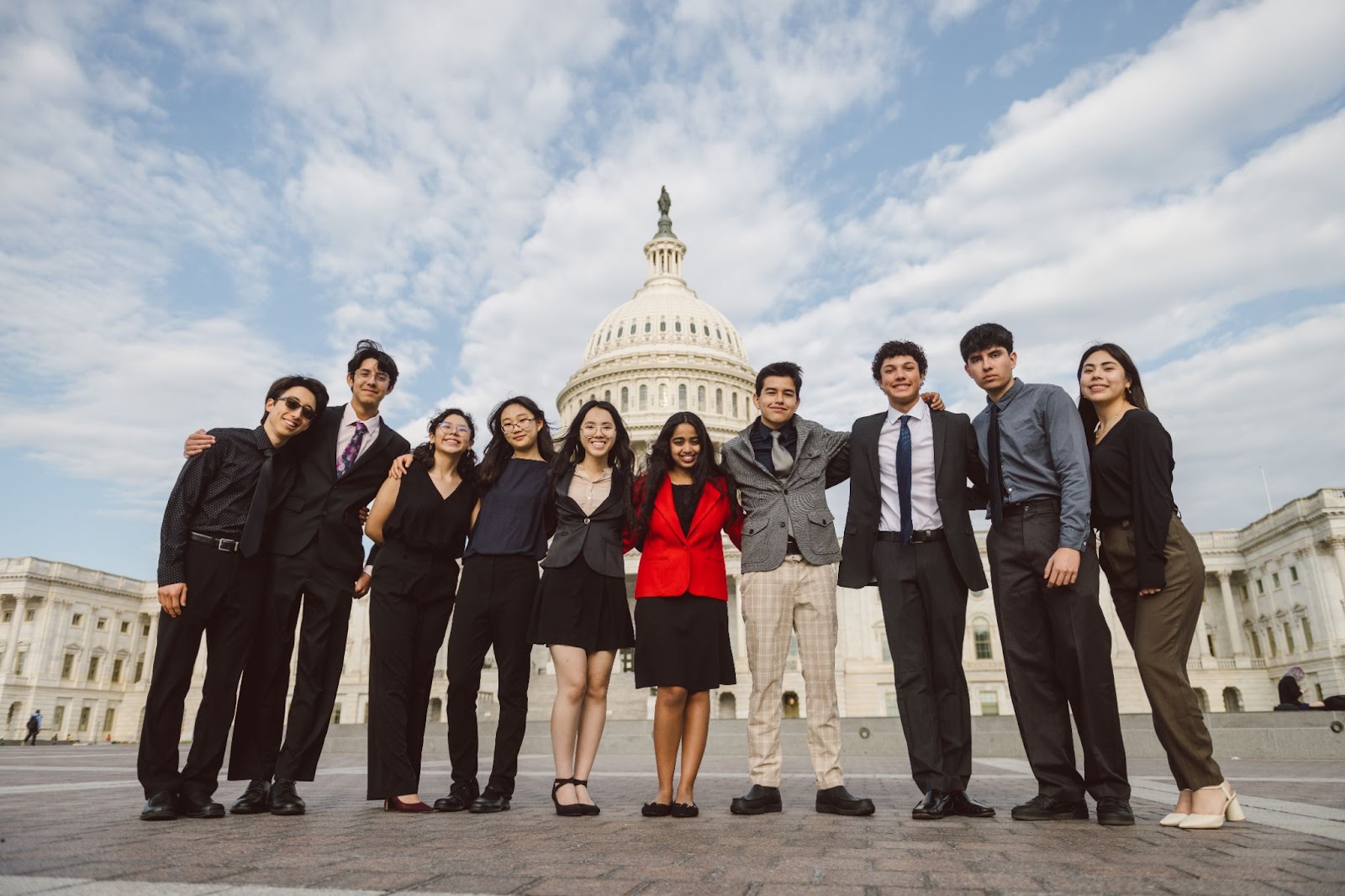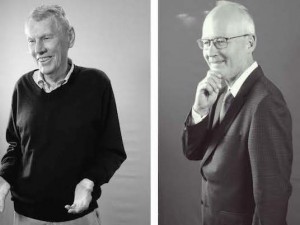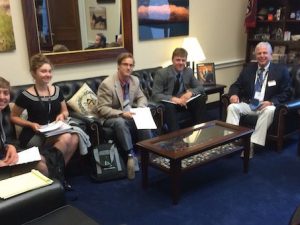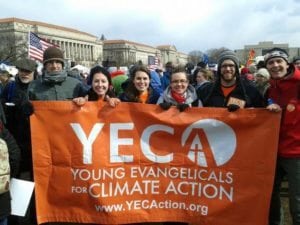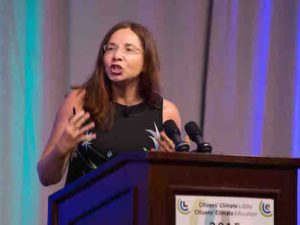Episode 98: Rebels or Advocates? Dana R. Fisher on the Future of Climate Change Action
Angry and Ready: Dana R. Fisher’s Climate Call to Action
In this month’s Citizens’ Climate Radio, host Peterson Toscano introduces listeners to the fiery and determined voice of Dana R. Fisher, a veteran in the climate change movement with nearly 30 years of experience. Fisher, the author of “Saving Ourselves: From Climate Shocks to Climate Action,” delivers a searing critique of the fossil fuel industry and the ineffectiveness of incremental policy changes. This episode challenges listeners to consider the strategies needed to combat climate change and our roles in this fight.
Dana R. Fisher: The Voice of Urgency
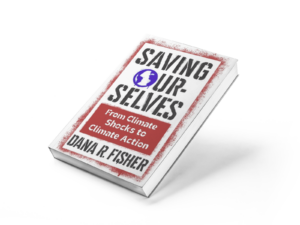
Rebels, Advocates, Helpers, and Organizers: We Need Them All
Drawing from discussions from Episode 93, Peterson revisits the four roles change-makers play: advocates, rebels, helpers, and organizers. While most Citizens’ Climate Lobby volunteers fit the advocate role, Fisher stresses the need for more rebels and organizers to amplify the pressure on decision-makers. Fisher’s call to action is clear: systemic change requires bold, sometimes uncomfortable actions. Peterson admits to his own discomfort with disruptive demonstrations but acknowledges their necessity in the broader strategy for climate action. “While I deeply respect the work of groups like Citizens’ Climate Lobby, it’s clear that advocacy alone isn’t enough. We need more rebels, more organizers, and more systemic change to truly address the climate crisis.” –Dana R. Fisher. About Dana R. Fisher 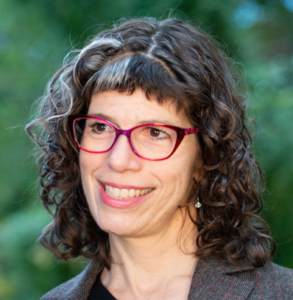
Listen Now!
Good News: Bipartisan Success on Energy Permitting Reform
“The Energy Permitting Reform Act stands out as a beacon of cooperation in a divided political climate, offering real hope that we can accelerate the transition to a cleaner energy future.” –Peterson Toscano Peterson shares a rare piece of bipartisan good news. The U.S. Senate Committee on Energy and Natural Resources has advanced the Energy Permitting Reform Act with overwhelming support. This bill, which aims to streamline the permitting process for green energy projects, marks a significant step forward in building a sustainable energy infrastructure in the United States. The bipartisan nature of this success serves as a hopeful reminder that cooperation is still possible in the fight against climate change. Learn more about Permitting Reform.
Why Climate? Featuring Dalton Jackson
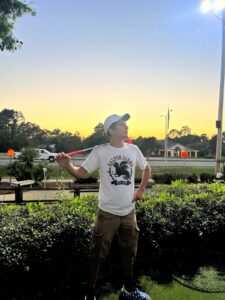
Youth Corner: The Climate GOAT Campaign

Resilience Corner: Self-Care in Climate Work
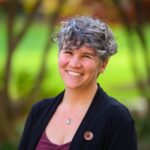
Looking Ahead: Hot Mess – A True Crime Climate Mini-Series

- For general actions and campaigns, Visit www.cclusa.org/action to explore current campaigns, find practical steps you can take today, and become part of a growing community committed to creating a sustainable future.
- For college students: Check out cclusa.org/highered to discover opportunities for engagement and leadership in climate action on your campus.
- For middle and high school students: Visit cclusa.org/youth to get involved in youth-led initiatives and make your voice heard on climate issues.
Listener Survey
We want to hear your feedback about this episode. Please fill out our short survey. Join the Conversation Engage with other listeners and share your thoughts on our social media channels. Follow and connect with us on X, Instagram, LinkedIn, Facebook, and TikTok. We Want to Hear from You
- Email: radio @ citizensclimate.org
- Text/Voicemail: 619-512-9646 (+1 if calling from outside the USA.)
Production Team:
- Written and produced by Peterson Toscano, Veda Genesan, and Tamara Staton.
- Technical Support: Ricky Bradley and Brett Cease
- Social Media Assistance: Flannery Winchester
Music is provided by epidemicsound.com Read the Transcript SPEAKERS Tamara Staton, Veda Ganesan, Dana R Fisher, Dalton Jackson, Peterson Toscano Peterson Toscano 00:00 Welcome to Citizens Climate Radio, your climate change podcast. In the show, we highlight people’s stories, we celebrate your successes, and together, we share strategies for talking about climate change. I’m your host. Peterson Toscano, welcome to episode 98 of Citizens Climate Radio, a project of Citizens’ Climate Education. In the Resilience Corner, Tamara Staton wonders why it’s so difficult for her to do the self-care she knows will benefit her. Veda Ganesan is back with a new Citizens, Climate Youth Corner installment. She tells us about the new GOAT Campaign. (goat sound) No, not that kind of goat. In our newest segment, Why Climate? college student Dalton Jackson discusses conservative outreach in Indiana, climate change, and his first car. Plus, I have a good news story about a surprising bipartisan legislative success in the USA. Peterson Toscano 00:59 But first, I recently spoke with someone who has been in the climate change movement for almost 40 years. She has written eight books and contributed to the most recent IPCC report, and she is frustrated and very angry. Dana R Fisher wrote the book Saving Ourselves: From Climate Shocks to Climate Action. When you hear Dana read from it, you, too may feel angry. She offers a scathing critique of the fossil fuel industries’ covert moves to interfere with IPCC findings and the chronic inability of elected officials to respond to the causes and impacts of climate change, or you may feel angry at Dana herself. While she sees value in our volunteer advocacy work, Dana insists we need much more than incremental change efforts. She is calling on citizens to be troublemaking rebels. Here is Dana R Fisher reading from Saving Ourselves. Dana R Fisher 02:03 When I started, I had some pretty rosy expectations about the ways that we could solve the climate crisis, although we didn’t call it that back then. Al we needed was to discover and invest in a technological silver bullet that would bring about what we called ecological modernization. If we followed the same model used to solve the ozone hole, we could decouple economic development from carbon emissions and industrialize our way to a more ecologically sensitive third path of sustainable development. At that time, the science of climate change had already been well documented by two assessment reports of the IPCC, and a third was on the way. While this International Panel of Climate experts worked tirelessly and for free to synthesize the state of knowledge and get the information out to governments and the public. They were concentrated interests with access to power who used every means available to block efforts to reduce greenhouse gas emissions at all scales of governance, including planting experts on the IPCC with the help of specific governments. These interests continue to exercise a disproportionate amount of power over decision-makers, even today. They continue to damper the message of the various IPCC reports and to slow down the progress of the climate regime. It was only in the most recent sixth assessment report that those vested economic and political interests were finally discussed. Dana R Fisher 03:19 However, the report, which was released in 2021 2022 still does not name specific polluters and specific proponents of climate misinformation. Their roles are downplayed even further in the summary for policymakers, which is the most read part of the multi-1000-page reports. Thirty years into attempts to address climate change, it is abundantly clear that those actors who have amassed their wealth and power through industrialization, powered by fossil fuel extraction and combustion, have a stranglehold on economic and political power, as some people cling to the hope technological innovation and ecological modernization can save us from ourselves. There are limited data to support this perspective. Instead, there is growing resistance to the notion that incremental political change can get us where we need to go. More and more evidence points to the fact that the only way forward involves extensive systemic change. With all these influential and expensive drags on climate action, it is no wonder that we have yet to achieve our climate goals. Instead of the systemic change that is woefully needed, we have all been redirected to focus on taking personal steps to make a difference. The only solutions that have received any real political support are ones that push for incremental change that will not fully address the problem. In fact, even the United Nations Environment Program concluded in Fall 2022 that, quote, incremental change is no longer an option. Peterson Toscano 04:39 As I read her book, I appreciated Dana’s honesty about the seriousness of climate change impacts and how woefully we have addressed its causes. Still, I had questions, so I met with Dana to learn more about her and why she wrote the book. 04:56 Dana R Fisher I’m a professor at American University, and I research around climate politics and climate activism. Therefore, I wrote Saving Ourselves: From Climate Shocks to Climate Action. I’m an academic. I’m a social scientist, but I work in the world where, at least, I believe that the science is only as valuable as the message that gets out to the general public and to, you know, both the political world, the general public, etc, and so forth. And so I’ve done a lot of work that we call like actionable science. We call it public sociology. In my field, where the idea is to take the research findings and have them mean more than just speaking to, you know, the other 25 people who work in the specific field where you work, the crisis is getting worse. Dana R Fisher 05:37 I mean, I’ve been studying the climate crisis since before we called it a crisis, right? I had been studying it since the 1990s. My first book, which was my dissertation, was on the Kyoto Protocol, which was supposed to save us, and it did not save us from ourselves. No, not at all, as I talk about in the book. There was this momentum growing for me, the momentum built even more by the fact that I was a contributing author for the most recent IPCC assessment. I was asked to write a new section on civic activism and engagement, the people power and the way that the people power is contributing to mitigation because this was in the report on mitigation. I mean, I was happy to be asked. I was happy to contribute, and I was happy that the IPCC started thinking about the ways that the people broadly can contribute to addressing the climate crisis. The whole reason that we do it is so that we can contribute to the policy-making process. It was really an impotent process for me, and I wanted to do more. And that’s when I decided that the next thing I was going to do that I was going to focus my attention on was I was going to write a book that was for the general public. Dana R Fisher 05:38 I confess I felt defensive when I read Dana’s book, especially when she discussed the failures of incremental change. I have been a volunteer citizen lobbyist since 2013, and I am thrilled by the growth of green energy projects and emerging technologies I see. And what about the Inflation Reduction Act? That was a big deal. Are you saying our work has been in vain? Dana R Fisher 07:07 It’s become really clear to me that technology isn’t going to save us, certainly not the technology that exists today, and that we need to think really clearly about the ways that different policy actors are contributing to the crisis and in some cases, particularly in the in the case of fossil fuel interests, are obfuscating and intentionally delaying climate action and climate progress. Now that we have the Inflation Reduction Act, which is basically regulating to address the climate crisis using what’s what we call a carrot versus a stick, right? So it’s basically putting money into the system to push for a transition away from fossil fuels and towards clean energy. That’s the whole way that the Inflation Reduction Act is working. And I talk about how that’s basically an example of incremental policymaking. Incremental policy making is not going to get us where we need to go in the timeline that is necessary given the timeline of the climate crisis. Dana R Fisher 08:05 You know, we have a worsening climate crisis that is driven by concentrations of greenhouse gasses that have accumulated in the atmosphere and continue to accumulate at too high rates. That’s the timeline that we’re on now. It’s not being determined by us and by the policy making process. It’s not being determined by different presidential terms, which is the way that a lot of elected officials tend to think. If we did not have this timeline set by the concentrations of greenhouse gasses and the timeline based on how much we already have in the atmosphere and how the world has already changed. Increment policymaking could be wonderful, and it would, long term, get us where we need to go. It just won’t get us there in time. That’s why I talk about in the book the fact that we need to move away from incremental policy-making to more substantial systemic changes because the systemic changes are what will shift the whole system that we’re working on that is currently fueling our industrial everything and our economy. We need to have systemic change away from that so that we can potentially meet the deadline here. And the deadline is, you know, Earth’s deadline. It’s not my deadline. It’s not policymakers’ deadline. It’s not an election. Based on what my colleagues in the natural sciences the atmospheric sciences, are telling us, the deadline is, you know, fast approaching, and we are standing on the precipice of substantial, potentially, you know, cascading disasters. Those disasters, while they can motivate the kind of changes that are needed, what we really need is to put pressure on moving this faster alone because incremental policymaking is going to be the death of us all, or could be the death of us all. Let’s say it that way. Peterson Toscano 09:53 Earlier this year, in Episode 93 of Citizens Climate radio, we revisited the four roles change make. Have traditionally played advocate, rebel, helper and organizer. Advocates are the people working within the system, speaking with lawmakers and working through the courts. Most CCL volunteers are advocates. Rebels are groups that engage in disrupting tactics in the streets, congressional offices and art museums. I shared these four roles with Dana. Dana R Fisher 10:24 Right now, we do not have enough rebels. I also don’t think we have enough organizers. We need more of that to support the helpers and the advocates so they have more tools and more capacity. And capacity comes from knowing that you have the ground troops behind you helping you push for the types of changes that you’re asking for. The more you are speaking for the general population, the more power you have. Having more rebels and having more organizers who are coordinating the action in the streets will be so helpful for getting us where we need to go because it can’t just be pushing against social change within the system because we know how that works. Because unfortunately, we have these concentrated interests, otherwise known as fossil fuel interests, who have privileged access to power privileged access to natural resources, and they have the capacity to push back quite substantially to the kind of advocacy we’ve seen so far around the environment, which is not a criticism at all of the kind of work that people in citizens, Climate Lobby and other advocacy groups are doing. It’s just saying that we need more backup and we need more power because these folks have a lot of power, they have a lot of resources, and they’ve been granted a lot of access to decision-makers that we don’t have because we don’t pay for their campaigns. The same way Peterson Toscano 11:46 Dana believes we need to see more organized actions to pressure the people in power so the powerful will enact the changes advocates are proposing. I agree, and I also know that I feel an aversion to being part of demonstrations that disrupt traffic and make a scene. I’m most comfortable in a helper role, giving people a ride to the demonstration, baking sandwiches or raising money. The work that rebels do is vital and potentially messy. Dana R Fisher 12:19 I don’t see a way forward without people in power feeling threatened, be they people in power who are funded by the fossil fuel companies or the fossil fuel companies themselves. That is the opposite of futility. But it’s power. It’s raw power coming from citizens. But unfortunately, it also involves risk. For sure, we tend to be very uncomfortable as a society with the idea of causing trouble, even if it’s good trouble. But I mean, I think one of the things that has been lost in the memory of the civil rights movement, and I, and there are people who have written some really good stuff about this in the past few years, about the ways that the civil rights movement and the memory of the Civil Rights Movement has been polished all the grittiness and all the unpopular components of the movement have been extracted from the memory so that it looks shiny and positive and like everybody was supporting it. And as I talk about and I actually have the evidence in my book, and I also have put it in more recent pieces, the civil rights movement was extremely unpopular. It was so unpopular, in fact, that many of the leaders were assassinated, right? That was the good trouble that led to the successes that the Civil Rights Movement accomplished. Peterson Toscano 13:40 Good trouble. This reminds me of the black gay Quaker civil rights activist Bayard Rustin. H would say, “We need in every community a group of angelic troublemakers.” Dana calls on people to be engaged in addressing climate change. Many people are alarmed, and they’re standing on the sidelines. We each have a role to play on this rapidly changing planet. CCL volunteers, chapter leaders and people doing office tasks together contribute to a growing movement. Dana recognizes that climate action comes in many forms. Dana R Fisher 14:23 Many people focus on this all of the above energy strategy, which is not working for us very well if you think about the climate crisis, but we do need is an all of the above activism strategy. I mean activism that brings people in to push for change at any level and any manner that they think that they’re comfortable with, right? And so some people are going to be advocating. Some people are going to be working towards electoral change. Some people are going to be in the streets, you know, occupying the streets, and it we’re going to need all of it, because the climate crisis is a really tricky problem, and solving it is going to take all of us doing whatever we can. Dana R Fisher 15:07 There are so many people who care so much, care so deeply, who are involved, and more getting involved every day. That will happen even more so, as my research shows, as people experience the climate crisis firsthand; while that is something we need to worry about, it also is something that we should both be getting angry about in terms of the ways that we have been manipulated into permitting these specific privileged actors to have privileged access to our common resources. But also, we should take hope in the fact that there are so many of us, and we know that, you know, people power, when we work together, can change the world. And this is what we’re going to need to do, is work together to change the world. But I am very confident we can. Peterson Toscano 15:52 That was Dana R Fisher. She is the Director of the Center for environment community and equity and a professor in the School of International Service at American University. Her book is Saving Ourselves: From Climate Shocks to Climate Action. It is available wherever you get books. You can visit her website, Danarfischer.com, and please follow Dana on Tiktok, where I first encountered her and her work. I have these links in the episode show notes. You will find them at CCLusa.org/radio. Peterson Toscano 16:35 Coming up the Resilience Corner, the CCL Youth Corner, a good news story, and an announcement about our special True Crime climate podcast launch. Veda Ganesan 16:47 Welcome to Citizen Climate Radio’s Youth Corner. We’ll delve into the latest developments in climate action and environmental issues, all from the youth’s point of view. I’m Veda Ganesan. CCL National Youth podcast lead. Today, we’re highlighting a new campaign called the GOAT campaign, otherwise known as the greatest of all time, and now it has nothing to do with goats. What is this campaign all about? How are youth and their connections igniting political change? And how can you inspire youth to join the cause? Veda Ganesan 17:28 If someone asks you what comes to mind when they think about politics and elections? Climate change may not be your first choice. However, it’s crucial to remember that our elected officials will be the ones making choices for our future, and there’s no doubt that we want them to make climate change and the health of our earth a top priority. I’m concerned that youth may not be able to have their opinions reflected on the ballot. I also know that we are the most affected by the government’s decisions and the ones who will suffer the impact in the future. The Climate GOAT Campaign is a collaboration between the Higher Ed and National Youth Action teams of the Citizens Climate Lobby. It provides students with a way to voice the need for climate action as a voting priority and take action to keep the earth clean for future generations. Veda Ganesan 18:16 At first glance, talking to others about the looming danger of the climate crisis seems daunting. However, this campaign has simplified it to two surprisingly manageable conversation types–relational organizing and deep canvassing. Veda Ganesan 18:30 Relational organizing is a strategy in which you encourage people with whom you share close connections, such as family members, mentors and peers, to consider how their vote impacts our climate the goal is to mobilize a community of climate conscious voters. Veda Ganesan 18:46 Deep canvassing is another conversation method that emphasizes empathy and emotion. Its intention is to open up someone’s mind regarding a significant subject such as climate change. By using our power to speak with people who know us and care about us. We can gather votes for climate action and put our climate, our earth and our future on the ballot. At the same time, we’re also improving our personal communication skills. Veda Ganesan 19:11 It’s time for the leaders of the next generation to step up. Are you ready to use your voice to get climate action on the ballot? If so, sign up and join us. Visit CitizensClimatehigher ed.org/climate-goat that’s CitizensClimate, higher ed.org/climate-goat. You can also find us on the Empower app. Be the climate GOAT and get out the climate vote. Veda Ganesan 19:37 That concludes our time with you. This episode was written by Annabelle Hui, an avid member of the National Youth Actions Communication Team. Thank you for joining us for the CCL Youth Corner, and stay tuned for our next episode on the new CCL Youth Summit and Flow conference. Peterson Toscano 20:15 Thank you, Veda. That was Veda Ganesan with the CCL Youth Corner. You can learn more about GOAT, the great electrification challenge ,and much more. Visit CCLusa.org/youth. Peterson Toscano 20:31 Now it is time for the resilience corner with Tamara Staton. Tamara Staton 20:36 Hi. I’m Tamara Staton CCLs, education and resilience coordinator. This is Resilient Climateeering through Unexpected Climate Connections. Tamara Staton 20:50 Today’s topic is self-care and climate. I don’t know about you, but sometimes I know exactly what I need. I know what to do to feel whole, at peace, and thriving. But despite this awareness, I don’t do it. I ignore that inner voice and do something totally different. Maybe I eat ice cream instead of an apple. Maybe I watch one more episode when I know it’s time for bed or I desperately need to take a day off, but instead, I plow through my ever-growing to-do list. This has me wondering: why do so many people so rarely prioritize self-care? Tamara Staton 21:25 For me, my strong drive often gets in my way. It’s hard for me to stop my momentum. Once I’m moving like I have to shift my energy from going to stopping, and that feels counterintuitive, even though I know it would be good for me to take a break because I’m feeling really stressed out or overwhelmed. For example, it can be hard. I also feel pretty small in the face of climate change sometimes, and that’s not just because I’m short. I’ve known for years that, while important, my individual actions aren’t enough to solve this problem. If we’re going to make any headway, I need to think bigger than myself, and that doesn’t really leave any room for self-care. According to the deepest, darkest recesses of my mind, I worry that self-care is selfish. I worry that if I’m not always focused on climate change and fulfilling a purpose bigger than myself, then I’m dipping into that selfish space. Tamara Staton 22:19 But what’s it like for you. When does your desire to prioritize purpose leave no space for you and your needs? What do you do when you feel other aspects of your life, like climate work are simply far more important with no room for this whole self care thing, and how does that affect you in the long run, building resilience in ourselves directly contributes to a more resilient world. Self care interspersed into climate work is climate work. Tamara Staton 22:51 The reality is that most of us work more efficiently, think more clearly, and are far more creative when we regularly do something to slow down and care for ourselves; it’s kind of like regular maintenance of a car or E-bike in addition to plugging in or filling up for power and needs fresh tires and ongoing maintenance. This avoids breakdowns when you need reliability, and just like looking after your ride, it might help both you and others to lean on community for support. What keeps you from following through on self-care? What strategies and techniques have you found successful in maintaining a regular self-care practice? Feel free to email me, radio @ citizensclimate.org Tamara Staton 23:36 I’m Tamara Staton with the Resilience Corner. Thank you for listening and for your commitment to progress. To learn more about tools, trainings and resources for staying strong through the climate challenge, check out our Resilience Hub at CCL usa.org/resilience, and until next time, remember this. Find your passion, let it guide you, and you’ll do amazing things for our world. Peterson Toscano 24:03 Thank you, Tamara. Like you, I find myself resistant to doing what I need to do for self-care. So yeah, it’s a good question to be pondering. The Resilience Corner is made possible through a collaboration with Tamara Staton. She is the education and resilience coordinator for citizens, Climate Education, the resiliency Hub website is CCL usa.org/resilience. Peterson Toscano 24:33 Each month, we feature climate action figures engaged in climate-related work, and we ask them, Why? Why climate? )ut of all the issues crying out for our attention, why is this issue so important to you? Today we feature Dalton Jackson. This summer, he worked on CCL conservative outreach in Indiana. Dalton Jackson 24:58 I grew up on a Family farm with my dad. We worked with his side of the family over in Jamestown, Indiana, but I grew up technically in Lizton, Indiana, and that is where I continue to live to this day. I am going into my senior year of college. I am studying Law and Public Policy. Dalton Jackson 25:18 I’ve spent this summer traveling quite a bit, as well as working with CCL on conservative outreach to try and bring more conservatives and people on the right side of the political spectrum into conversations about climate change. Dalton Jackson 25:34 Climate change became kind of an important issue in my life, kind of around the time I got my first car. I was never a huge automotive junkie growing up, but when I got my first car, that changed something in me, and I started learning, you know, more about engines and about vehicles. And growing up on a farm, we’re around these behemoths of machines all the time. Tractor tires are huge. I’m, like, six foot. I think most of them are probably about as tall as me, big, huge titans that roll around and just drink diesel like nothing else and spit smoke and it wasn’t really until I got my first car and started understanding how the technology actually works that. Oh, hey, there’s a bit of a concern here if we don’t start thinking about the alternatives. This was around 2018 2019, and people had started thinking of the alternatives and had been for a while, Dalton Jackson 26:22 I started getting more into looking into electric cars or hydrogen powered vehicles specifically for like semis and tractors and stuff, because I grew up on a farm and and that stuff is important for me to think about and consider of oh, well, if the farm continues, what are farmers going to be using some day, in the future, and then that turned into, well, what about the power grid? Dalton Jackson 26:44 Indiana is mainly a coal-backed state, or a natural gas state. What happens to our power grid when we start transitioning things? It just kind of evolved from there. And a lot of my fascination to this day is still with power sources and where do we go from here. I think that’s the main issue people see with people on the right is, oh, well, they just don’t believe it, and we have to convince them. And that’s not a strategy that’s going to work for a lot of people. Dalton Jackson 27:09 What’s going to work for a lot of these folks is to convince them of the cost benefits. Because a lot of people out here and in rural parts or that are Republicans or right-leaning are more concerned with the money side of things, as opposed to the climate side of things. And that’s not to say there are no Republicans who don’t think climate change is happening. It’s just that older members of the community they need to be convinced on other fronts. They need to be convinced of the benefits before they can be convinced of the harms that are happening. So I think a lot of them bring kind of that fiscal thinking to the conversation. Dalton Jackson 27:43 Just because somebody is a Republican or right-of-center or seems a little bit put off by the whole climate change, it doesn’t mean that they don’t care, or it doesn’t mean that there’s no hope of just because they are conservative or Republican, it’s important not to exclude them, and it’s same thing goes for a person out there as conservative, just because you are conservative is not a reason to stay out of the conversation. Peterson Toscano 28:10 Thank you, Dalton. Now, if you want to share your reasons why you’re engaged in climate work, email me, That’s radio @citizensclimate.org Peterson Toscano 28:34 in a moment, I’m going to tell you about our brand new climate change true crime mini-series. It’s called Hot Mess. But first, I want to share this good news story with you. Peterson Toscano 28:45 It comes from a Senate committee in Washington, DC. In a rare and encouraging display of bipartisanship, the US Senate Committee on Energy and Natural Resources has advanced the Energy Permitting Reform Act with an overwhelming 15 to four vote. The Energy Permitting Reform Act aims to streamline the permitting process for critical energy projects, significantly reducing the time it takes to get green energy projects off the ground. The clean energy measures in this bill are crucial for maximizing the climate benefits of the Inflation Reduction Act, which allocated substantial funds for green energy projects. Without the necessary permitting reforms, America can’t build and connect clean energy projects fast enough, Thus delaying the transition to a cleaner energy future. Peterson Toscano 29:43 The Energy Permitting Reform Act addresses this by cutting red tape and ensuring these projects can proceed without unnecessary delays. In addition to all the clean energy benefits of this bill, it’s particularly exciting that it’s garnered support from both sides of the aisle by including elements that appeal to Democrats and Republicans. The bill has a much better chance of being passed through Congress and becoming law. Peterson Toscano 30:10 While no legislation is perfect, and this bill includes provisions for fossil fuel development to secure broad support, the overall impact is expected to be a net positive for reducing climate pollution. Further analysis will continue as the bill progresses, but the initial momentum is promising. Peterson Toscano 30:31 The Energy Permitting Reform Act is not just about energy policy; it’s about moving forward together to tackle the urgent challenge of climate change. To learn more about permitting reform and why it is important in climate work, visit CCL usa.org/permitting reform. Email me if you have good news you want to share on the show, Radio at Citizens climate.org. That’s radio @citizensclimate.org Peterson Toscano 31:03 I hope you are feeling inspired and motivated by the stories you heard on today’s show. You can move beyond individual action by joining one of our practical campaigns, along with 1000s of others. Visit CCL usa.org/action. That’s CCL usa.org/action. Peterson Toscano 31:25 We have been working on it for a long time, and at last, you will hear the premiere of Hot Mess: How Climate Consensus Turned into Political Chaos. Peterson Toscano 31:38 In this five part mini series, we will explore how the united concern about global warming unraveled and stalled climate change solutions. In the first episode, we’ll look at the beginning of us climate politics. It includes a period of cooperation and consensus that may sound like fiction to some people, but once upon a time, not too long ago, there was bipartisan concern about global warming. Then things began to unravel. Peterson Toscano 32:13 We take a deep dive to figure out who was responsible for what; we also reveal climate change heroes on both sides of the aisle. Joining me to examine this history will be Chelsea Henderson, host of the EcoRight speaks podcast. Chelsea is the author of a new book, Glacial: The Inside Story of Climate Politics. Katie Zakrzewski, one of the hosts of Green Tea Party Radio, will provide insight with a dash of hot sauce, and former US Representative Bob Inglis, a Republican climate hero will add his commentary. Peterson Toscano 32:52 Oh, the twists and turns, the missed chances, the villains and the relentless climate action figures. Hot Mess will give us a fresh perspective on the American climate change politics history. Look for it on this same channel, starting in mid-October. Hot Mess: How Climate Consensus Turned into Political Phaos. Is a special project of Citizens Climate radio. Peterson Toscano 33:45 Thank you so much for joining me for episode 98 of Citizens Climate radio. This episode was written and produced by me Peterson Toscano, along with the CCR team, Veda Ganesan and Tamara Staton. Other technical support from Ricky Bradley and Brett Cease. Social media assistance comes from Flannery Winchester. Moral support from Madeline Para. The music on today’s show comes from epidemicsound.com. Peterson Toscano 34:15 Many thanks to everyone who’s been engaging with us on our social media. You can find us on Instagram, X, LinkedIn, Facebook, and TikTok, and we definitely want to hear from you. Call or text our listener voicemail line that number is 619-512-9646, plus one; if you’re calling from outside the USA, that number again 619-512-9646 Peterson Toscano 34:46 Visit CCL usa.org/radio, to see our show notes and find links to our guests. Citizens. Climate radio is a project of Citizens. Climate Education.

